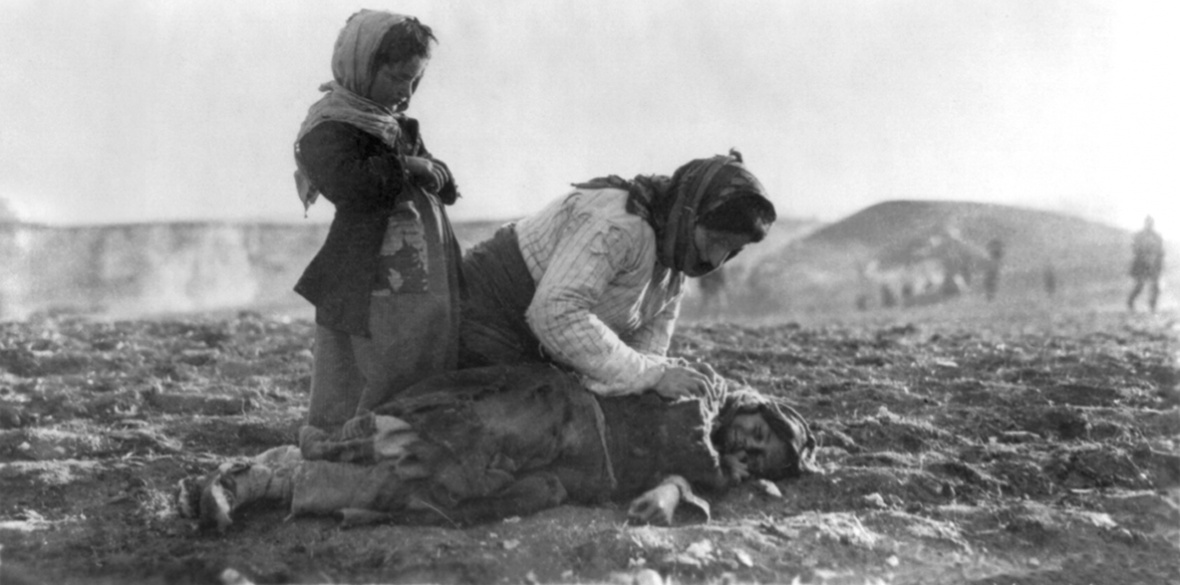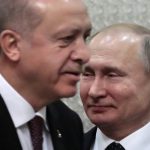Armenian woman kneeling beside dead child in field “within sight of help and safety at Aleppo” Photo: American Committee for Relief in the Near East
Between 1.5 and 1.9 million Armenian men, women and children were killed – but our government refuses to recognise the genocide, writes STEVE SWEENEY
EVENTS are taking place in towns and across the world today to commemorate one of the worst atrocities in human history — the Armenian genocide, which began on April 22 1915 and led to the systematic extermination of 1.5 million people.
In what became known as “Red Sunday” due to the amount of blood that was shed, the Ottoman leader Talaat Pasha gave orders that saw the arrest and detention of hundreds of Armenian community leaders in Istanbul, then know as Constantinople.
Politicians, journalists and religious leaders were among those rounded up in night-time raids by the Turkish Ottoman authorities. It paved the way for the systematic destruction and annihilation of the Armenian communities in Ottoman Anatolia and is remembered today as Armenian Genocide Memorial Day.
The so-called “Young Turks” were to declare the entire Ottoman Armenian population a dangerous fifth column and laws were passed without parliamentary debate. This enabled the passing of Pasha Talaat’s “deportation order” which saw signs posted in eastern Anatolian streets giving Armenians five days in which to leave.
Secret extermination orders were drawn up by leading Committee of Union Progress (CUP) party official Dr Bahaeddin Sakir.
The plans, which were not written down, ordered the mass murder of Armenians. Any provincial official who asked for the orders in writing or opposed them in any way was killed or moved aside.
Between 1.5 and 1.9 million Armenian men, women and children were killed in the ensuing genocide.
Those who survived describe the brutal treatment that was meted out to Armenians who were forced from towns and villages on death marches, many of them buried in mass graves on their route to modern-day Syria
Hakob Moutafin’s grandfather told him that they marched “on foot, hungry and thirsty, sun-scorched and exhausted.”
When they arrived at their destination “the Turks had started to cut off the heads of the Armenians with axes and to throw them in the Euphrates River. It is said that the water of the Euphrates River was coloured red by the Armenians’ blood.”
Another eyewitness told how she heard an Ottoman army officer give the order to “poison the dogs.”
Place names along the routes of the death marches are a reminder of the atrocities committed by the Ottomans. A large cave near Der-Zor called “Sheddadie” derives from the Arabic word for “a place of a terribly great tragic event.” It was here that Turkish gendarmes forced Armenians into the cave before shutting the entrance and setting it on fire.
The term genocide was first used in 1933 by the Polish lawyer Raphael Lemkin. His concept was developed in response to the atrocities perpetrated against the Armenians after he was outraged at the lack of recognition and awareness of what had occurred.
It took until 1946 for the United Nations to officially recognise the term which was finally adopted after the 1948 Genocide Convention following the atrocities committed by nazi Germany.
The Armenian genocide was used by Hitler as a blueprint for the Holocaust and extermination of the Jewish people. In a speech to nazi generals ahead of an offensive against Poland he urged them to “kill without mercy men, women and children of the Polish race or language. Only in such a way will we win the lebensraum that we need. Who, after all, speaks today of the annihilation of the Armenians?”
But there were no international courts to bring the perpetrators to justice at the time of the mass killings of Armenians. What is now known as a genocide was then “a crime with no name.”
That a massacre took place is not in doubt. Even the Turkish state — which denies the Armenian genocide — agrees that 600,000 Armenians were killed. These are the same people who claim there were only 1.1 million Armenians living in Ottoman ruled Turkey at the time, and that they were victims of a civil war within a world war.
But, even by their own admission, and using their own dubious figures produced to downplay the scale of the barbaric crime against humanity, more than half the Armenian population was killed.
The Turkish denial of the Armenian genocide reaches far beyond its borders. It should be of huge concern to the international community that the Turkish state not only attempts to erase the Armenian genocide from the history books, but persecutes and prosecutes those who speak out about the killings.
Failure to learn the lessons of history dooms us to repeat it. The methods used against the Armenians are the same used in other, future massacres such as that against the Alevi community in Maras in December 1948 and against Turkey’s Kurdish community in the country’s south-east.
Hrant Dink, a respected Turkish-Armenian journalist who did so much to build bridges between the two communities and whose tireless efforts to bring about a recognition of the Armenian genocide, was cruelly and senselessly murdered, shot dead by a Turkish nationalist outside his newspapers Istanbul office on January 19 2007.
He was killed because the truth he was telling and the questions he posed meant that the Turkish state was forced to confront an uncomfortable reality about the country’s blood-soaked history.
Dink believed that justice for Armenians lay in the broader context of democratisation of Turkey and the granting of rights to the country’s sizeable Kurdish population, along other minorities that are facing discrimination enshrined in Turkish law.
This issue remains prescient today and is key to solving the country’s so-called Kurdish question, with many warning that the authoritarian President Recep Tayyip Erdogan’s ruthless actions amount to ethnic cleansing and a genocide against Kurds.
While the United Kingdom’s devolved parliaments officially recognise the Armenian genocide, the British government does not. The reason given for its official indifference is callous, however goes someway to answering the questions asked by many Kurds — why don’t they care about what happens to our people? — as Turkey is given a free hand to carry out attacks on Kurdish populations in the country’s south-east or in northern Syria.
A freedom of information request by the barrister Geoffrey Robinson QC revealed Britain’s shameful secret. The Nato ally was too important both politically and commercially to upset by recognising the Armenian genocide.
A revealing memo to the foreign secretary outlined the government’s position saying “it is “open to criticism in the ethical dimension, but given the importance of our relations (political, strategic and commercial) with Turkey … the current line is the only feasible option.”
To date only 30 countries officially recognise the Armenian genocide. Most recently the right-wing government of Italy and Emmanuel Macron’s neoliberal French government have drawn the ire of Erdogan for designating April 24 an official commemoration of the Armenian genocide.
In 2015 Erdogan threatened to ban MPs from New South Wales from attending the centenary of Gallipoli after its state parliament recognised the genocide. And more chillingly he warned the Swedish Parliament and the US Congressional Committee on Foreign Affairs that he would deport 100,000 Armenian guest workers after they used the term genocide.
Britain’s failure to officially recognise the Armenian genocide exposes the toxic relationship with Turkey. It has placed strategic interests above human rights, however, there remains a human cost to the intransigence.
Theresa May was the only European leader to welcome Erdogan with a state visit during a crucial presidential and parliamentary election that was seen by many as a death knell for democracy in Turkey. The government’s silence as opposition MPs remain in jail along with journalists, academics and public-sector workers who have been purged from their posts speaks volumes. But the answer lies in its attitude toward the Armenian genocide which it classes as a tragedy.
Turkey has been emboldened and Britain’s feeble approach to the Nato member state has created the conditions for the persecution of democratic forces and the ethnic cleansing of Kurds.
Hrant Dink was correct in saying justice for Armenians would come within the broader context of the democratisation of Turkey.
This is unlikely to take place as long as Erdogan remains in power with Britain and other imperialist powers complicit in propping up his authoritarian regime. For real change Erdogan and his government need to be swept aside in Turkey and the Tories in Britain replaced by a government with a foreign policy based on solidarity and co-operation not war and profit.
Dink’s funeral brought people together in a unique and powerful display of unity between the two communities he described as “two close peoples but two distant neighbours.”
As the banners said then, the genocide and its recognition affects us all: “We are all Armenians.”
By STEVE SWEENEY
Source: Morning Star



